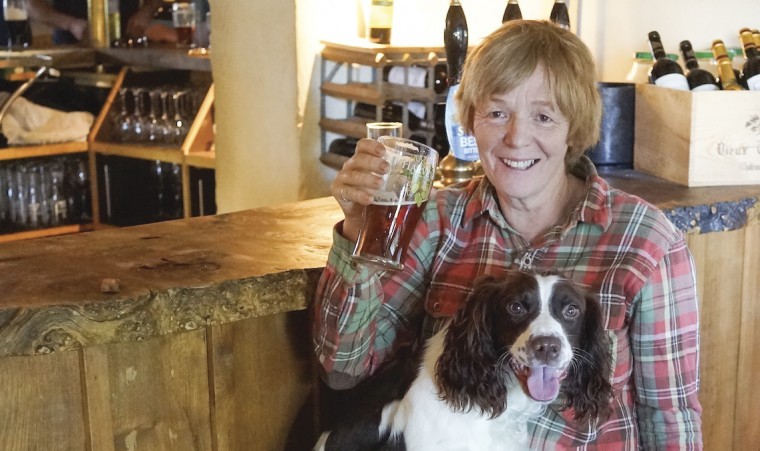“You must do better” a farmer advised me as I made my way out of the pub. He wasn’t referring to the amount of alcohol that I’d consumed! “Cheeky mongrel” was my initial reaction but then I decided perhaps it’s a good mantra. After all, I often reassure myself that tomorrow I’ll do better. Having good aspirations is easy but “doing” can get complicated. I blame the many distractions in life.
Smart farming is all the rage. “The Boy” says I won’t qualify, even if I feed the pigs while wearing my tweed jacket. Although I’m now the proud operator of his old chuck out iPhone, he says that doesn’t count either. I find smart ‘phones are both indispensable and infuriating. Middle daughter tells me that abstract testing would reveal my intellectual reasoning, logic and ability to spot trends. This test apparently comprises of a series of symbols, diagrammes or shapes from which you decide what comes next in the sequence. The results would show my potential to solve problems. Typical modern world gobbledygook! I say bring back common sense.
At this year’s South of England conference the panel discussed “Sustainability – what does it mean?” My dictionary describes it as: capable of being maintained at a steady level without exhausting natural resources or causing severe ecological damage and non inflationary economic growth.
Soil is our greatest asset: most farmers would agree with the speaker on that point. We learnt that soil structure is five per cent organic, 45% minerals, 25% air, and 25% water. Earthworms mean money – now they had my attention.
Earthworms help with the drainage, aeration and nutrient retention of the soil. Apparently 400 per square metre is the optimum number. I think I’ll skip the earthworm counting as I have difficulty enough counting my sheep. I was slightly shocked to hear the statistic that 50% of earthworms are killed when the land is ploughed. People have cultivated the land for years. No more ploughing matches? There’ll be a riot! One Nuffield Scholar promoted scaling up agricultural business in combination with no tillage. Personally I have some reservations about this route: the cost of the drill kit required was hair raising and the liberal use of sprays involved might not be all good.
I applauded a delegate’s suggestion of rewards for producing quality food in a way that has less impact on the environment, while keeping intact the social weave of the countryside. The thorny question was how could this be measured and who will pay for it? Retailers are notoriously reluctant to raise food prices unless it benefits the shareholders. There are pros and cons for all farming systems. Varying soil types and weather conditions require different solutions. My view is that we only have one life and one planet to live on, so nurturing both is good.
Talking planet, I salute the technology, camera crews filming and the producers of the BBC series Planet Earth 2 narrated by Sir David Attenborough. This is a truly amazing programme, packed with interesting facts and stunning photography. I will happily pay my TV license and appreciate watching programmes of this calibre.
In contrast I’m dismayed by the Christmas 2016 John Lewis advert. I acknowledge that dogs like to bounce and trampolining is a great way for children to expend their energy at Christmas. However the very idealistic and sentimental portrayal of a couple of foxes, badgers, a squirrel and hedgehog all bouncing on a trampoline together is ludicrous. Are the makers of this advert unaware that badgers are the natural predators of hedgehogs? I despair.
Some people don’t understand the consequences of an uncontrolled badger population. They eat hedgehogs but also ground nesting birds and eggs. I’ve seen badgers attack lambs and any ewe that has the misfortune to get cast they’ll feast on her bag. But most concerning for us cattle farmers is the risk of them spreading TB. The process of yearly TB testing is logistically challenging for farmers. It’s also a stressful and a worrying time. Luckily this year our herd were clear. But having inconclusive or TB reactors has very real emotional and financial implications.
I get worried when I’m selling fat lamb. Nationally lamb prices have fallen (week ending 18 November) and this is blamed on the strengthening pound, a knock on effect from Trump. In a live auction I’ve the option of taking my lambs home, but that doesn’t put money in my bank. This week I was intrigued by our creative auctioneer’s strategy when he introduced me as teetotal. The discussion at the time was on whisky: actually I was thinking a hip flask might be a good idea, Dutch courage and warmth in one hit. Joking apart, we need to grow our markets to maintain a vibrant UK lamb industry. Please everyone tuck in to some yummy, tasty English lamb.
Two days before we were due to put our tups in, one of my swanky rams was found in the dyke. He’d been attempting to visit a neighbouring flock. Luckily he was discovered before drowning and in fading light on a chilly evening and he was extracted and returned to the home paddock. Thankfully no lasting damage – only a dented ego which was quickly dissipated when we released him with our ewes and he soon got to work. The other trio of newbies stood by mesmerised by their change of circumstances. This is always a worry when you’ve paid good money for shearling rams. However by the next day they’d all clued up and were enjoying their work.
That farmer in the pub was talking about writing. Duly noted. Must do better next year.
Enjoy the Christmas festivities. Keep safe and healthy, wishing you all happy prosperous sustainable farming in 2017.




